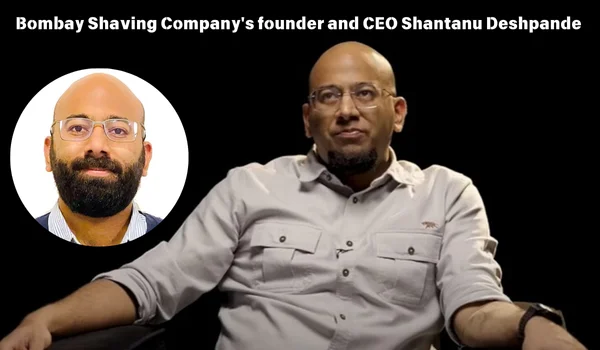In a world where workplace dynamics and employee engagement remain hot-button issues, Shantanu Deshpande, the Founder and CEO of Bombay Shaving Company, has reignited the debate with his bold statements about jobs and employee motivation. Speaking at an event, Deshpande asserted that “99% of people won’t show up to work if they’re not paid,” emphasizing that most individuals do not enjoy their jobs and are primarily motivated by financial incentives. His remarks have sparked widespread discussions across industries, drawing both criticism and applause for their raw honesty.
The Controversial Statement
Deshpande’s comments were made during a discussion on workplace culture and employee productivity. He stated that while passion and fulfillment are ideal goals, they are not the driving factors for the majority of employees. Instead, financial security and obligations form the backbone of their motivation.
“Most people are not passionate about their jobs. If you stop paying them, 99% of them won’t show up. It’s a transactional relationship, and we need to accept it,” he said.

His remarks have struck a nerve, with many applauding his realism while others criticized his perspective as overly cynical, dismissing the importance of employee satisfaction, mental well-being, and purpose in the workplace.
Reality Check or Oversimplification?
Deshpande’s assertion resonates with many who view work primarily as a means to an end—a way to secure financial stability and meet personal goals. This pragmatic view aligns with the reality of a significant portion of the workforce, especially in a country like India, where socioeconomic factors play a major role in career choices.
However, critics argue that reducing the employer-employee relationship to a purely transactional level oversimplifies the complexity of modern workplaces. Employee engagement surveys and workplace studies consistently highlight the importance of factors such as growth opportunities, recognition, workplace culture, and a sense of purpose in driving productivity and loyalty.
Social Media Backlash and Support
As expected, Deshpande’s comments quickly went viral on social media, triggering a wave of reactions. Some users expressed agreement, saying that the CEO’s statement was a much-needed dose of reality.
“It’s the truth no one wants to admit. Work is work, and not everyone can afford the luxury of passion,” one user wrote.
Others, however, criticized the statement for disregarding the aspirations of employees who seek fulfillment and happiness at work.
“Comments like these reflect why toxic work cultures persist. Leaders should inspire employees, not reduce them to cogs in a machine,” said another.
The debate has exposed a rift in how people perceive work—some see it as a necessity, while others view it as a platform for personal growth and impact.
The Broader Implications
Deshpande’s remarks shine a spotlight on the evolving dynamics of the workplace in India. With a growing millennial and Gen Z workforce, there is an increasing demand for roles that align with personal values, offer work-life balance, and foster professional growth. The traditional notion of work being purely transactional is being challenged by younger generations who prioritize mental health and workplace culture.
On the flip side, many employees in India, particularly in lower-income brackets, still view jobs as a necessity for survival, with passion taking a backseat. Deshpande’s statement may hold true for this demographic, highlighting the stark disparity in work-related motivations across socioeconomic strata.
What Do Studies Say?
Numerous studies have examined employee motivations and workplace satisfaction. According to Gallup’s State of the Global Workplace report, only 21% of employees worldwide are engaged at work. In India, the figure is even lower, with disengagement driven by factors like lack of recognition, limited growth opportunities, and poor work-life balance.
However, companies that focus on building a positive workplace culture and providing meaningful roles often report higher levels of employee satisfaction and retention. Leaders who invest in creating purpose-driven environments tend to inspire loyalty and commitment that go beyond mere financial incentives.
Leadership Responsibility
As a leader, Deshpande’s remarks have also sparked discussions about the role of CEOs in shaping workplace culture. Critics argue that leaders should take responsibility for creating environments where employees can thrive, rather than resigning to the idea that work is purely transactional.
“If 99% of people don’t like their jobs, maybe it’s time to reflect on the kind of work culture we’re fostering,” said a prominent HR professional on LinkedIn.
Proponents of Deshpande’s view, however, argue that honesty about the nature of work allows for more practical leadership strategies, focusing on providing fair compensation and opportunities rather than trying to artificially foster passion.
Moving Forward: Balancing Realism and Aspiration
The debate around Deshpande’s comments underscores a critical need for balance in workplace dynamics. While it is true that financial compensation remains a primary driver for most employees, it is equally important to acknowledge that work satisfaction, recognition, and purpose significantly impact productivity and well-being.
For organizations, this means adopting a two-pronged approach:
- Fair Compensation: Ensuring employees are well-compensated for their contributions is non-negotiable.
- Fostering Engagement: Creating opportunities for growth, recognizing achievements, and fostering a positive workplace culture are essential for long-term success.
Conclusion
Shantanu Deshpande’s remarks have served as a wake-up call for corporate India, challenging leaders to rethink their approach to employee engagement. While his candid acknowledgment of work’s transactional nature resonates with many, it also highlights the need for a broader conversation about the future of work in India.
As organizations grapple with the complexities of a changing workforce, the focus must shift from merely meeting financial needs to creating holistic environments that empower employees to find meaning and motivation in their roles. The challenge lies in bridging the gap between realism and aspiration, ensuring that work is not just a necessity but also a platform for growth and fulfillment.

Hello, I’m Kapil Kumar, a seasoned SEO expert and blogger at WinnersList.in. My mission is to spotlight exceptional individuals and organizations across various domains. Through curated lists, profiles, and inspiring stories, I aim to celebrate outstanding achievements and inspire the next generation of champions. Join me in this journey.
